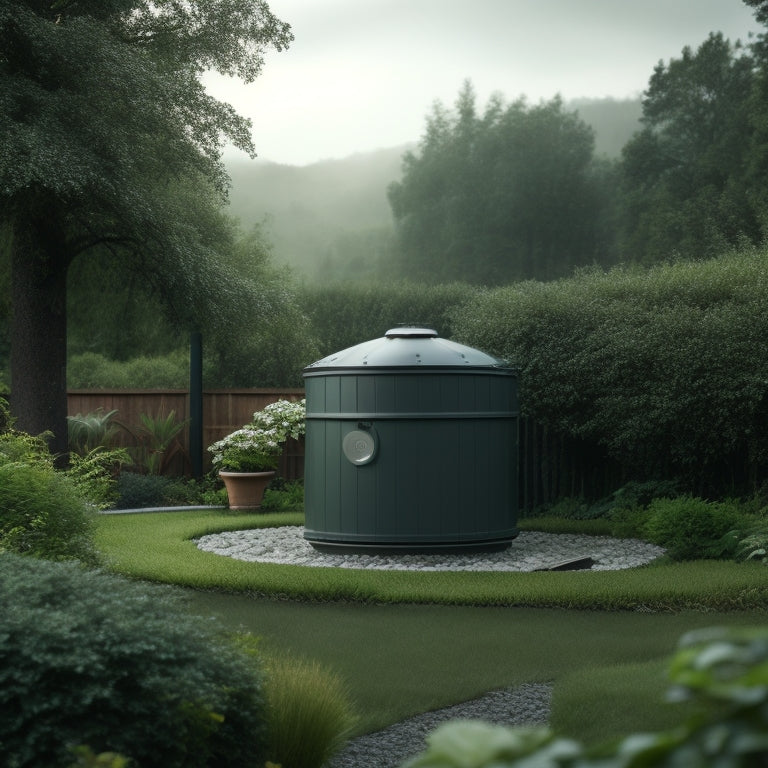
5 Best Rainwater System Upkeep Practices for Sustainability Enthusiasts
Share
You're taking an important step towards sustainable living by investing in a rainwater system, and now it's vital to prioritize regular upkeep to guarantee peak performance and water quality. To do this, inspect your system every 3-6 months, cleaning gutters and downspouts to maintain functionality. Regularly maintain filters, checking tanks and pipes for corrosion, sediment, and cracks. Monitor water quality through pH testing and contaminant analysis, and prepare your system for seasonal changes by inspecting and cleaning gutters, checking overflow valves, and installing freeze-resistant spigots. By following these practices, you'll be well on your way to maximizing your system's efficiency and sustainability - and there's more to investigate to guarantee you're getting the most out of your rainwater system.
Key Takeaways
- Regularly inspect and clean gutters and downspouts to ensure optimal rainwater system performance and prevent water damage.
- Maintain filters according to type and placement, cleaning or replacing them as needed to prevent clogs and pressure drops.
- Perform regular checks on tanks and pipes for corrosion, sediment buildup, cracks, and damage to ensure system integrity.
- Monitor water quality through pH testing, contaminant analysis, and regular testing to identify issues and take corrective action.
- Prepare your rainwater system for seasonal changes by inspecting and cleaning gutters, installing freeze-resistant spigots, and checking overflow valves.
Regular Inspection and Cleaning
Every three to six months, inspect your rainwater system to verify it's functioning at its best. During this process, focus on gutter maintenance to guarantee they're clear of debris and functioning properly.
Check for sagging or loose gutters and secure them if necessary. Also, verify that downspouts are extending at least 3-4 feet away from your home's foundation to prevent water accumulation.
Proper overflow management is essential, so inspect your system's overflow valves and confirm they're not clogged. As with solar-powered EV charging reducing carbon footprint solar-powered solutions, a well-maintained rainwater system can also contribute to a more sustainable living.
Make sure the overflow pipe is directed away from your home and isn't causing water to accumulate around the foundation. By performing these tasks, you'll be able to identify and address any potential issues before they become major problems.
Filter Maintenance and Replacement
How often do you think about the filters in your rainwater system? They're essential for removing debris and contaminants, ensuring your harvested water is clean and safe for use.
You'll need to inspect and maintain your filters regularly, depending on the type and placement. Regular maintenance is vital, just like in solar panel recycling where improper disposal can lead to soil and water contamination hazardous waste disposal.
Screen filters, for instance, should be cleaned every 1-3 months, while cartridge filters may need replacement every 6-12 months. Consider the flow rate, water quality, and filter type when determining maintenance schedules.
Proper filter maintenance and replacement will prevent clogs, reduce pressure drops, and guarantee ideal system performance. Stay on top of filter upkeep to enjoy a reliable and sustainable rainwater harvesting experience.
Tank and Pipe System Checks
Many components work together to guarantee your rainwater system functions seamlessly, and the tank and pipe system are critical among them.
You'll want to perform regular checks to verify they're functioning at peak efficiency. Start by inspecting the tank for signs of corrosion, sediment buildup, or cracks.
Check the pipe system for any signs of damage, rust, or corrosion. Confirm pipe insulation is in good condition to prevent heat loss and microbial growth.
To maximize energy production, consider ideal solar panel array design and energy-efficient equipment selection in your rainwater system.
Conduct leak detection tests to identify any hidden issues. Look for water stains, warping, or mineral deposits around fittings and connections.
Water Quality Monitoring Tips
Your rainwater system's water quality is essential, as it directly impacts the health and safety of its users. You must regularly monitor water quality to verify it's safe for consumption, irrigation, or other uses.
Start by performing pH testing to determine if your water is too acidic or alkaline. Ideally, the pH level should range between 6.5 and 8.5. Next, conduct contaminant analysis to identify any harmful substances, such as bacteria, viruses, or chemicals.
Integrating renewable energy sources, like solar power, into your rainwater system can help reduce its carbon footprint and contribute to a more sustainable future. Also, consider implementing energy storage solutions to address peak-hour energy demand.
You can use testing kits or send water samples to a laboratory for analysis. Regular monitoring helps you identify issues early, allowing you to take corrective action and maintain a safe and sustainable rainwater system.
Seasonal System Preparation
As winter gives way to spring, or summer yields to autumn, your rainwater system requires adjustments to confirm peak performance and longevity.
You'll want to inspect your gutters and downspouts for debris, cleaning them out to guarantee proper water flow.
Additionally, consider integrating energy-harvesting roofs with photovoltaic panels solar canopy solutions to generate electricity sustainably while providing a durable surface.
In colder climates, consider installing freeze-resistant spigots and frost-proof valves to prevent damage.
For regions prone to heavy rainfall, check your system's overflow valves to verify they're functioning correctly.
By performing these seasonal checks, you'll maintain your rainwater harvesting system's efficiency and extend its lifespan, aligning with eco-friendly practices that promote sustainability and water conservation.
Regular maintenance is key to maximizing your system's potential and reaping the benefits of rainwater harvesting.
Frequently Asked Questions
Can I Use Rainwater for Washing Machines and Dishwashers?
You can use rainwater for washing machines and dishwashers, but first, verify your rainwater filtration system is designed for household use and compatible with your appliances, as some washing machines may require specific water quality standards.
How Often Should I Test Water Quality for Bacterial Growth?
You should test rainwater quality for bacterial growth every 3-6 months to guarantee safe usage, following EPA guidelines, and adjust frequency based on system maintenance, seasonal changes, and personal health concerns.
Are Rainwater Systems Suitable for Areas With High Winds or Hail?
You're likely aware that 60% of the world's population faces extreme weather events; now, considering rainwater systems, you'll want to guarantee they're designed with wind protection and hail damage mitigation in mind to withstand harsh conditions.
Can I Connect My Rainwater System to a Greywater System?
You can connect your rainwater system to a greywater system, but you'll need to steer through greywater regulations, ensuring proper treatment and reuse. This combo amplifies rainwater benefits, reducing water dependence and promoting independence.
Do I Need a Separate Pump for Irrigation and Household Use?
You'll likely need separate pumps for irrigation and household use, as they require different pressure and flow rates; consider submersible pumps for irrigation efficiency and centrifugal pumps for household use, ensuring system integration and proper maintenance.
Related Posts
-

7 Best Automated Sprinklers for Water-Wise Green Homes
You're likely among the 75% of U.S. homeowners who use in-ground sprinkler systems, and coincidentally, you're also c...
-

7 Solar-Safe Window Solutions for Earth-Conscious Homeowners
As an earth-conscious homeowner, you're likely keen to find solar-safe window solutions that align with your values. ...
-

10 Grid-Tied Wind Power Systems for Modern Homes
You're looking for a grid-tied wind power system to utilize wind energy for your modern home. Here are ten options to...


